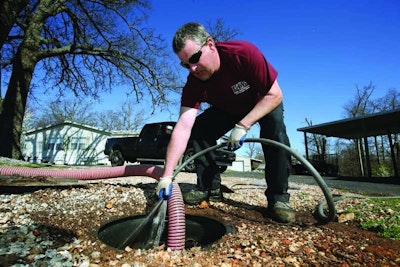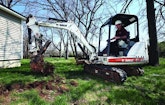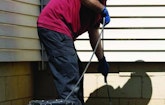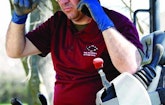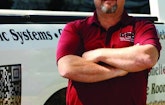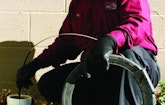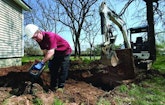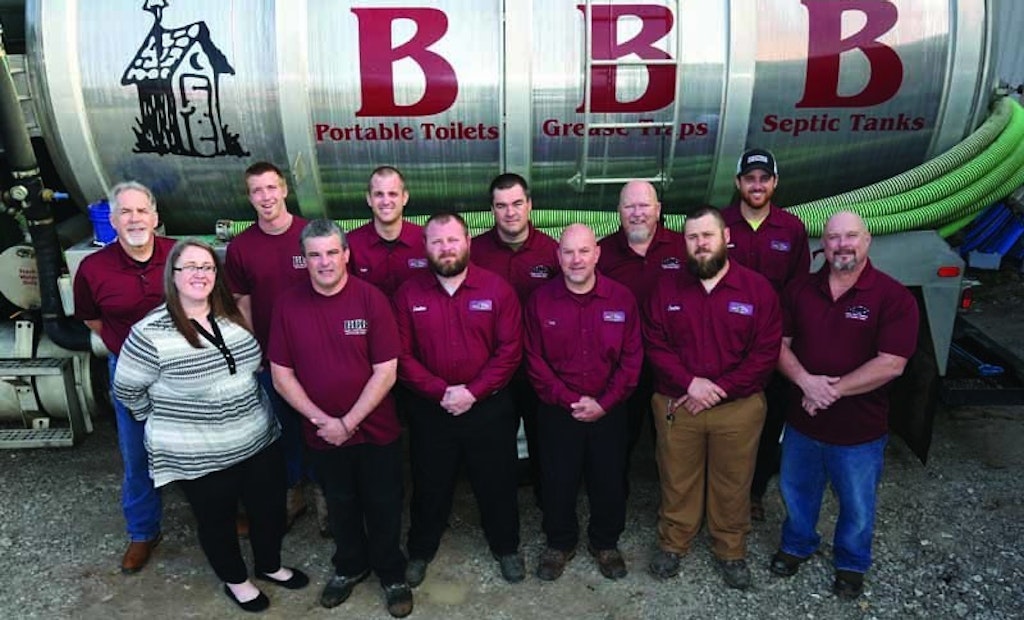
Interested in Septic Tanks?
Get Septic Tanks articles, news and videos right in your inbox! Sign up now.
Septic Tanks + Get AlertsIf its co-owner hadn’t been injured and laid up for a while two years ago, BBB Septic would not be the growing company it is today. The shoulder surgery wasn’t serious, but because of it Jon Jouvenaux couldn’t drive a truck or run equipment at the Bentonville, Arkansas, onsite wastewater company.
“I was 49 at the time. But what the injury also did was force me to work on the business rather than in the business,” he recalls. He and partner Dave Davis had always been busy with the daily details of running their company and serving customers — too busy. “We never had the time to figure out how to afford another employee or see what that next level of business looked like. But my injury changed our entire outlook and led to the growth spurt we have been in.”
It has led them to develop the market around Bentonville. If the town sounds familiar but you can’t remember why, try this name: Wal-Mart. “Through the ‘70s and ‘80s, this region was covered with chicken farms for Tyson and other companies. Then (transportations logistics company) J.B. Hunt and Wal-Mart started to grow, and our cities, Bentonville and this region, have become almost the hub of the spoked wheel of international business. Worldwide, everybody wants to do business with Wal-Mart.”
Fayetteville, Rogers and Springdale cluster with Bentonville in the northwestern corner of Arkansas, on the edge of the Ozarks. Combined the cities hold about 260,000 people. “When the economy was hot a few years ago, this was the fastest-growing region of the country, and the infrastructure never kept up. As a result, only a few minutes from downtown Bentonville there are neighborhoods on septic systems.”
BBB was formed in 1988 by a local man who drew the company name from his own name, which began with B, and the names of his two sons, which also began with B. When the founder became ill, his sons already had other careers. Jouvenaux, Davis and a third friend, who left the company last year, acquired it in the mid-1990s.
INSTALLING BASICS
Much of the company’s work is for small businesses and dwellings. Only a handful of new developments feed wastewater to a municipal treatment plant. More common are septic tanks at each home feeding effluent to an individual or community drainfield. A small percentage of installations are ATUs, Jouvenaux says.
Pumps are another standard feature. Because of the topography, water is often pumped uphill to a drainfield. Arkansas allows drainfields of pipe and gravel, 8-inch gravelless pipe, and Infiltrator Water Technologies chambers and EZflow. Lateral pipes surrounded with gravel are common, but Jouvenaux and his crew prefer Infiltrator chambers. They store more water than the standard pipe-and-gravel solution, and they’re better for maintenance, he says.
When a pipe-and-gravel system clogs, maybe an additive or jetting inside the pipe will help, but you can never reach the soil around the lateral; only the inside of the pipe is directly accessible. But when chambers are in place, you can dig a hole at the end of each lateral and flush or jet the entire system, Jouvenaux says.
About one-third of BBB’s business is septic system installation or repairs. Most of the rest is split between portable sanitation and septic and grease trap pumping. Recently the company added storm shelter and safe room installation, an in-demand service in a part of the country prone to tornadoes and heavy storms.
“This was not a planned strategy. It happened by accident,” Jouvenaux says. A customer asked if the company installed shelters. Well, Jouvenaux thought, it’s really just a big septic tank without the pipes. He called Hausner’s Limited, one of BBB’s tank suppliers and a long-standing Arkansas maker of precast products. It turned out storm shelters and safe rooms were Hausner’s primary line of business. BBB employees were trained and certified in installation.
“The bigger plus to this is we are not contacting only people with wastewater needs. Now our audience is anybody who owns a home, built a home or bought a home,’’ Jouvenaux says.
“When they need wastewater services, they already know us.”
IN THE GARAGE
BBB also does some work on the Wal-Mart campus, which has private lift stations to connect their wastewater system to the municipal system of Bentonville. That’s where one of the company’s trucks comes in handy. It’s a 2011 Chevrolet 3500 with a crane from Auto Crane Co. of Tulsa, Oklahoma. It’s the best way to lift and lower the large pumps in the Wal-Mart lift stations. “We almost never have to get into a lift station with a person because that crane gives us the muscle to pull pumps,” Jouvenaux says.
The rest of the fleet is:
- A 2001 GMC 6500 with a Satellite Industries 1,000-gallon waste/500-gallon freshwater steel tank; a 2006 GMC 5500 with a Satellite 700-gallon waste/300-gallon freshwater steel tank; and a 2004 International 4300 with a Longhorn Tank Company stainless steel 1,000-gallon waste/500-gallon freshwater tank. All three trucks use Jurop/Chandler pumps. The tanks were purchased at auction and BBB added them to the chassis in their own shop.
- A 2000 Freightliner FLD112 with a Specialty B 2,300-gallon steel tank and Jurop/Chandler pump — this truck also carries a pressurized water tank adapted from a concrete truck, particularly useful to serve restaurant grease traps; a 2000 Freightliner FLD112 with a Longhorn 3,700-gallon aluminum tank and Jurop/Chandler pump — this truck also carries a freshwater tank custom built by Longhorn to fit between the cab and frame; and a 2011 Peterbilt 388 with a 4,700-gallon Pik Rite steel tank and Masport pump.
- A 2013 Dodge Ram 3500 1-ton pickup; two 2014 Ford F-350 1-ton trucks (Jouvenaux and his partner drive these to visit customers or run equipment to job sites, or they’re used in service if one of the regular service trucks is out of service); a jetter producing 40 gpm at 2,000 psi; and two Bobcat trackhoes, a 325 and a 430. The company also uses a Viztrac push camera from Amazing Machinery and a Goldak Triad locator to pinpoint onsite components.
NEW WAYS TO COMMUNICATE
Some of the tools that make the most difference to business at BBB are the company’s computers and mobile devices. About four years ago, a couple of years before Jouvenaux’s shoulder injury, the company switched to Apple computers. Neither he nor his partner are technical guys, and Macs are simple, more resistant to viruses and have fewer problems, Jouvenaux says.
At first, Davis printed off a daily schedule for employees. Then they shifted to using Apple’s free iCal calendar software. They still use that as a backup, but have shifted to The Service Program from Westrom Software, a fully integrated software package that handles scheduling, routing, billing and other chores. Everything is linked to technicians’ mobile devices in the field, and financial information entered there flows automatically into QuickBooks.
When a service call is complete, the technician hands his smartphone to the customer and invites them to rate the quality of the call on Rate a Biz, a branch of Yodle, which hosts the BBB website and provides other business services. If a customer hands the phone back with a rating of only two or three stars, the technician is right there to ask what they can do to make it a five-star rating. That’s why BBB has only four- and five-star ratings online, Jouvenaux says.
When a customer calls for an appointment, the office staff first captures an email address. When a service call is over, the customer receives another email with links to the company’s Facebook page, and to Angie’s List and other business-rating services, and the customer is invited to rate BBB there, too. Not every customer does it, Jouvenaux says, but only a few responses on a service like Angie’s List greatly increase the visibility of the business.
For the same reason, BBB recently hired a freelance writer to produce copy for the company’s blog and other social media outlets. Again, the reason was Jouvenaux’s need to work on the business rather than in it. Analytics for the website showed traffic dropped in January when he didn’t have time to post entries, he says.
Jouvenaux talks very knowledgeably about all these technical topics and the ins and outs of social media platforms, yet his knowledge is new. It is another result of the injury and an illustration of what someone can do and learn in a couple of years.
PEOPLE SKILLS
Jouvenaux meets with real estate brokers to educate them about onsite wastewater systems, why the systems should be maintained, and why they need time-of-sale inspections, which is generally not required in the region. He also meets with property owners’ associations to educate them about wastewater systems.
From three employees, the company has expanded to seven full-time people, which increases to 12 with temporary help when workload is heavy. In the early 2000s, many onsite systems were installed as the area expanded, but owners did not do maintenance, so many are now having problems. Relationships with real estate brokers are key to getting this business because they may provide referrals to BBB before a homeowner has a problem.
Hiring good employees is also a key to success. In many cases, the BBB management knows new employees in other ways. Dustin Lamp, the employee with the greatest longevity, was a friend from church working in an auto repair shop that was not doing well. At the same time, BBB was spending a lot of money to have repairs done outside the company. It was a natural pairing to bring in-house a skilled mechanic who could also operate equipment and a pump truck.
Brook Cannedy, another employee, has a background in electrical work, was a family friend, and was ready for a new job at the same time BBB was looking for a person to take over the pump service and installation side of the business. Jouvenaux found a source of qualified workers in the local school district. Through his wife, Julie, a teacher, he found school bus drivers who hold commercial licenses and have hours free in the middle of the day. Some of them became portable restroom technicians.
ON THE HORIZON
Jouvenaux and Davis have not stopped thinking about the future. They’re currently mulling treatment options. There’s a lot going on in watersheds around his area, Jouvenaux says.
Aging infrastructure and a lack of investment mean municipal wastewater plants are limited in how much septage they can accept or, because a few people dumped contaminated loads, refuse to let any pumper discharge at plants.
So at the WWETT Show in Indianapolis, Jouvenaux explored small-scale products to process wastewater. Options could include a small treatment plant or dewatering equipment. He and Davis are still thinking about that and are also considering expanding their portable restroom business.
There is competition for BBB, of course. But Jouvenaux refuses to worry about it.
“We believe there’s more than enough work to go around,’’ he says. “And we keep our standards really high.”
Making the most of tech devices
Leave home for the job site and what goes along in the truck depends on the project for the day. But for BBB Septic in Bentonville, Arkansas, there are a few technology tools that go along with every worker every day: the company’s iPhones and iPads. And there are many reasons why these are indispensable devices, says Jon Jouvenaux, co-owner of the company.
There is easy communication with the office, and there is easy access to any document. The company has an account set up with the online storage service Dropbox. Each job has a separate folder, and in it are copies of permits and other documents a technician might need to call up while in the field. Registration documents for the company’s various trucks are there, too, so no matter what vehicle a technician is driving, the paperwork for it is available at the tap of a screen. The office staff has a Dropbox folder not accessible to everyone, and there they keep master copies. If a permit or some other document is accidentally erased from a job folder, it’s a simple matter to move a new copy into the appropriate folder.
The iPhones and iPads also have calculators. Their calendars interface with the master calendar for scheduling, and The Service Program software allows technicians to generate and complete job forms. Technicians also use the phones to gather satisfaction ratings from customers when a job is over, and there is an electronic level to quickly determine the slope of a pipe.
“Pretty much if my partner and I, who are in our 50s, can dream something up and put it online, our guys can pick it up quickly. Most of them are in their 20s and 30s, and I think the oldest is in his early 40s. When we tell them about an idea, they’re like, ‘Oh, yeah, we meant to tell you about that a year ago,’” Jouvenaux says.
